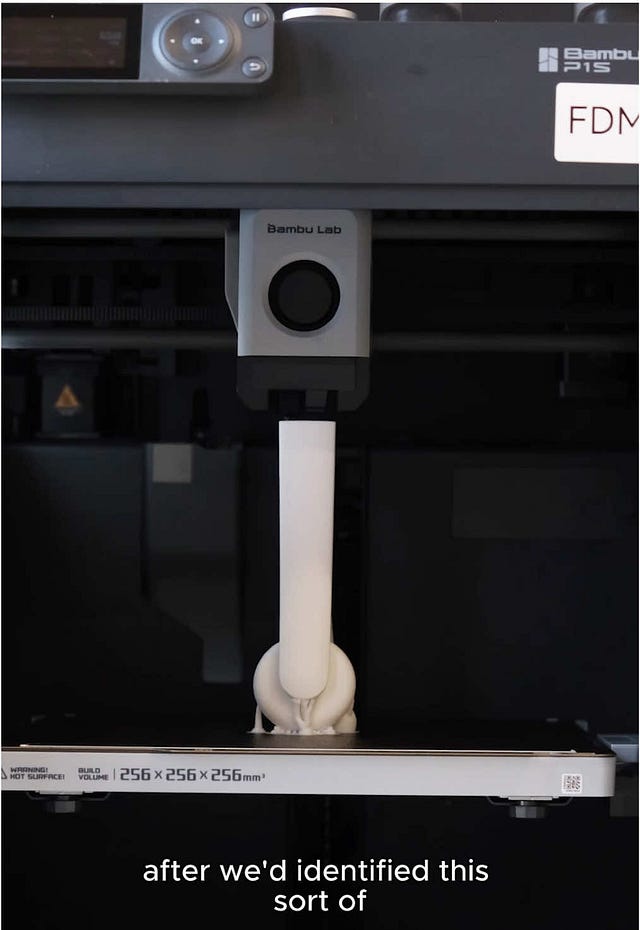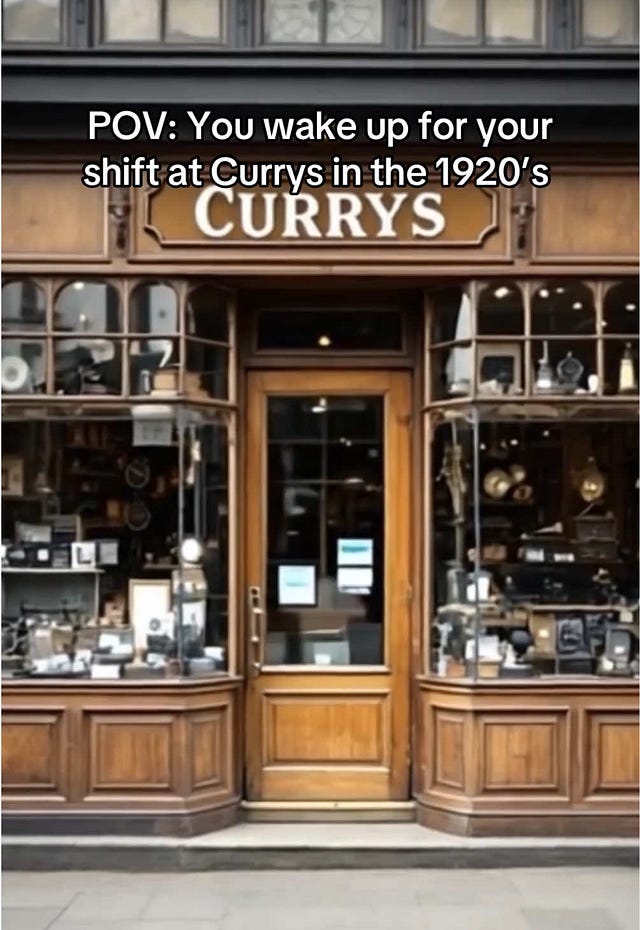Hello!
Thank you for joining me, I’m so glad you’re here.
I recently read a book called Shifting the Dials [Wordery] which I highly recommend. Essentially, it’s about prioritisation in life, but focuses on “dials” you may have - finance, career, family, hobbies etc, and how these may be dialled up or down depending on where you’re at.
I’m sure I’m not the only one out here who had a sucky few years with redundancies and job uncertainty. I was speaking with a friend today about how we approach our work compared with when we were younger. There have been multiple times in my career when my work has been my everything. Don’t get me wrong, I like my job. It’s an exciting opportunity, and there are great people around me. But unlike in previous points in my career, I’m not looking at my work as the place to find all my fulfillment. I’m sure in the future I’ll have points at which my work will be all-encompassing again, and I’ll gladly give my heart and soul. But Shifting the Dials gave me a great framework to get balance in my life and for the moment that’s what matters.
If you’re in a similar place, I highly recommend it.
I was thinking the other day about the changes we have had to make to early careers in recent years. The things we are all doing quietly, but not really talking about.
On Reddit, apprenticeship applicants seem to be getting “benched” a lot this week; they’ve been told they’re not unsuccessful, but they have not been allocated a spot on the programme yet. If one of the offer holders pulls out, they may be given a role.
This has become necessary due to the amount of reneging that happens in early careers recruitment; candidates will accept multiple offers and wait until Summer, see how the vibes are then decide which to take on. With any luck they will let the recruitment team know in good time, but sometimes they will just go AWOL and not show up on the first day.
So, “bench” has become a necessity.
It’s a bit of an art form, because you want to keep the benchers excited about the programme, enough to keep them warm should you need to call on them, but not so excited that they are overly disheartened about not getting a place.
Judging from the types of questions the candidates are asking on Reddit, the strategy seems to be to keep information light and to be a bit coy about what and why this is. I can understand it; you don’t want to go about saying people decide to turn down spots on your programme. But with some of the questions from those on the Amazon apprenticeship bench, it seems even the big names need to have these strategies. GTI group reported a couple of years ago that as many as 12% grads and 14% school leavers renege.
Mastering volume recruitment within early careers is an art in itself. It’s a completely different genre of recruitment to normal “grown up” recruitment. Knowing your numbers and success rates at each stage is really important, because you don’t want to reject too many people at the first hurdle and find that you don’t have enough people to fill all the spaces when you get to the end.
It’s even more important when you have multiple programmes, and/or for whatever reason you need to have a steady stream of people being placed throughout the year. I have one non-early career recruitment area currently where this is the case, and we have a steady stream of new joiners coming to be trained in this area throughout the year. While we have weekly intakes, we have to be agile to meet the needs of the business, increasing or decreasing, or even cancelling at short notice.
This is something I learned to do through a baptism of fire in a previous role. We were hiring c.1000 grads a year, training them in an area of tech before having them work as consultants to put their new skills into action. My team of 10 would process the 100+ daily applications, whittling them down to fall into one of our three or so cohort intakes a month, with 30-40 students in each.
The scale of the volume recruitment was hard enough. But being able to turn quickly and either decrease or increase numbers due to client demand was quite a skill. It meant being careful what we promised candidates, keeping everyone sufficiently warm but also giving them enough information to keep them satisfied until we knew where they could be placed. Having them email us every other day for updates would require recruiter capacity we just didn’t have.
But then business need changed and suddenly, instead of phoning people to give offers, we were phoning them to cancel their place in the cohort. That year, many other graduate programmes were doing the same; we weren’t alone. But as someone who was trying to navigate a team through this work, I found it frustrating how no one was really talking about our work in these things, or sharing best practice. Not even in confidential safe spaces.
Our candidates were informed of the cohort cancellation by phone, using approved scripts. Initially this made sense but as the weeks rolled on and each recruiter was spending the majority of their day making these calls, I found it hard to know how to lead a team through heartbreaking work, at that volume. I was desperately googling how managers of call centre workers supported their teams, or even mental health phone workers. How could I support my team making calls to people, breaking bad news, and withstanding all the emotions that resulted from that. I still don’t know the answer.
I had a lot of discussions around whether offer holders should be told first over the phone, or in writing. If over the phone first, then they get to hear that we are sorry, and that we want to personally tell them. But on the other hand, my team got all the initial raw emotions, were the front-line punch bags for months on end, and also the candidates were so in shock they weren’t able to ask questions that would help them. If breaking the news in writing, it is quite faceless; a coward’s move. But the few times we tried it (due to them not picking up the phone after a few tries) they had digested the information and had much more productive when we did manage to catch them on the phone. But the integrity of the company may be harmed through breaking up with the candidates by email.
The hard truth is that recruitment is a customer service role at the end of the day. We serve the hiring managers, delivering to them the candidates they need. We also serve the candidates, making sure they are happy, excited about the opportunities, and that all their questions are answered. If either side is unhappy; if the candidate is upset by something in an interview, if a poor recruitment choice was made, if a candidate decides last minute they don’t want to join, if either side is slow in making a decision, then it is the recruitment team who face the complaints. It’s their names that are associated with the process; their names that appear in Glassdoor interview reviews and in screengrabs on Reddit.
Recruitment in 2025, with all the uncertainty, is a customer service role more than ever. I’m sharing my experiences here in part because I want to start the conversation about the less glossy side of early careers recruitment, to build a foundation of the information I wish I’d had access to when we were facing hard times. But also in the hope that someone out there can learn from these experiences and give their candidates and managers better service. With any luck, we won’t have to go through another time where we are un-recruiting more than we recruit. Hopefully the market will settle and candidates will accept just one offer without us having to play around with a group of backup options. But until then, I really hope we can learn from each other a lot more as we navigate our field.
Links
1 in 7 16-24 year old is NEET - not in education, employment or training [BBC]. The number is at an 11 year high. Article found via my former boss Anne, with a note about the good work Form the Future do to tackle this issue.
Interesting post about how gen z find out about jobs through influencers rather than job boards. I’m not sure I’d go as far as to agree with this, but certainly there is a big part TikTok plays in how the next generation discover careers.
Loved this post from one of the members of the University of Cambridge’s careers team - “You are not a slave to your potential”. I can imagine a lot of their students could do with hearing this message.
Spotted this recruitment post from East of England Co-op, and was intrigued that instead of an ATS, they’re using a Microsoft forms. No CV required. I can’t work out if I think this is genius and the future, or if the person on the receiving end of these applications will be wading through an unorganised torrent of applications.
It seems the UK market is picking up, with commenters mentioning being approached for more roles in the last few weeks. Some hopefully messages in the comments section.
Some great apprenticeship content on there recently. Firstly a great guide for apprentices entering the workplace for the first time, written by my buddy Ed Goodman over at Multiverse.
Another great thread discusses the downsides of apprenticeships, and all the ways they can go wrong. This is an important side to consider, especially when only 54% of apprentices actually complete.
TikTok
What I love about this TikTok isn’t just that it’s a cute snippet of someone securing a grad role after so much work, but that someone on the early careers team is the top commenter, welcoming them. THIS is how you make candidates feel special.
My career video of the week wasn’t meant to be a career video, it’s an employee at Joseph Joseph explain how they go about inventing things that solve problems. I don’t know about you, but the video left me feeling excited about their company and the things employees can do there.

 Tiktok failed to load.
Tiktok failed to load.Enable 3rd party cookies or use another browser
I’ve not done a trend in ages, but here I am with the goods. It’s the “POV [point of view]: you wake up in…”.
The first video I saw of it was actually a Curry’s video:
 Tiktok failed to load.
Tiktok failed to load.Enable 3rd party cookies or use another browser
I believe the original was POV: you wake up in Victorian England, and it’s an AI generated video where you are surrounded by dying people in the street.
Since then, it’s been taken in lots of directions. Here are other examples I’ve come across:
POV: You wake up as a 27 y/o in New York.
POV: You wake up in London in 2025.
Using this meme like “POV: You wake up as a grad at ____” would be such a good move - but only if you can do it quickly. The meme is already a week or so old, so I think you’d only have two more weeks tops before it gets stale. You don’t need to use AI like in the original, just use the POV viewpoint and you’re good.
I hope you have a great week ahead.
Until next time,
Charlotte





